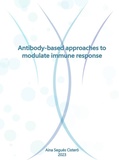Antibody-based approaches to modulate immune response

Segués Cisteró, Aina
- Promoter:
- Dr. E.J.A.M. (Alice) Sijts
- Co-promoter:
- Dr. D. (Dietmar) Zaiss & dr. A. (Andrea) van Elsas
- Research group:
- Sijts
- Date:
- June 13, 2023
- Time:
- 14:15 h
Summary
Monoclonal and bispecific antibodies have raised a lot of interest in the last few decades and outstanding results have been obtained using such antibodies in the field of immunotherapy. This thesis addresses different immunotherapeutic approaches to better understand their effects, in order to improve their clinical efficacy.
In this thesis, we started out reviewing the platforms currently used to generate bispecific antibodies (BsAbs), focussing on the strategies under development that aim to target immune cells such as T regulatory cells.
We further studied two different strategies to optimize the effects of therapeutic antibodies. For one, we demonstrated that bispecific antibodies bridging effector cells and target cells closer, show a higher anti-tumor activity. In addition, we assessed the effects of antibody isotype selection on the efficacy of immunotherapy, and showed that mouse IgG2a exerts the highest anti-tumor activity.
Moreover, we generated, produced, and characterized novel anti-mouse TNFR2 (Tumor Necrosis Factor Receptor 2) antibodies and studied their ability in vitro, ex vivo and in vivo to modulate T regulatory cell as well as effector T cell function.
Taken together, the results presented in this thesis highlight the progress achieved in immunotherapy approaches, with a focus on BsAbs and novel strategies to improve cancer treatments. Furthermore, novel anti-mTNFR2 antibodies were developed and featured as useful tools to unravel the role of this receptor in tumor growth.